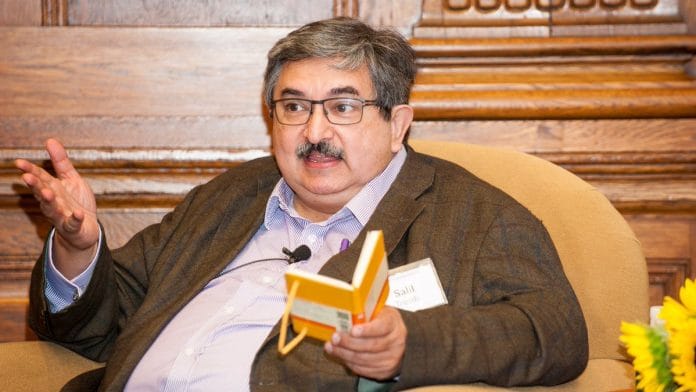New Delhi: Twitter Sunday suspended the account of Salil Tripathi, the senior journalist and chair of writers’ body PEN International’s ‘Writers in Prison Committee’.
The action led to outrage on Twitter, led by renowned British-Indian novelist Salman Rushdie, who asked the social media giant’s CEO Jack Dorsey “what is going on”.
“This is an outrageous act of censorship against one of the most important advocates of free speech. Twitter, stop it now! Jack what’s going on?” Rushdie wrote.
This is an outrageous act of censorship against one of the most important advocates of free speech. @Twitter stop it now! @jack what’s going on? https://t.co/Rwig7c3FHo
— Salman Rushdie (@SalmanRushdie) December 6, 2020
Pay attention @TwitterIndia. Get this suspension reversed now. https://t.co/ieq3dVpT7T
— Salman Rushdie (@SalmanRushdie) December 6, 2020
Author and journalist Nilanjana Roy, whose tweet Rushdie shared with a comment, said Tripathi had tweeted about the demolition of Babri Masjid on its 28th anniversary.
“Earlier today, he’d tweeted about the demolition of the #babrimasjid, expressing the continuing anguish many also feel — hope @TwitterIndia will restore his voice soonest,” Roy said.
Why has @saliltripathi's Twitter account been suspended?
Earlier today, he'd tweeted about the demolition of the #babrimasjid, expressing the continuing anguish many also feel — hope @TwitterIndia will restore his voice soonest. pic.twitter.com/3Ul3kQfvOe
— Nilanjana Roy (@nilanjanaroy) December 6, 2020
Jnanpith award winner Amitav Ghosh also called out Twitter’s decision to suspend Tripathi’s account, saying he is “beyond astonished” to learn about it.
“Salil is an outstanding journalist, writer and human rights activist. He is also the chair of PEN International’s Writers in Prison Committee,” Ghosh wrote.
Beyond astonished to learn that Salil Tripathi's @Twitter account (@saliltripathi) has been suspended. Salil is an outstanding journalist, writer and human rights activist. He is also the chair of PEN International's Writers in Prison Committee. @pen_int @ayadakhtar
— Amitav Ghosh (@GhoshAmitav) December 6, 2020
Also read: ‘Shame on IPS Roopa’ trends on Twitter as spat over cracker ban leads to account suspension
Why was the account suspended?
ThePrint contacted two Twitter spokespersons through phone calls and email, but they declined to comment on why Tripathi’s account has been suspended.
Twitter rules prohibit a user from threatening violence, violent extremism/terrorism, child sexual exploitation, abuse/harassment, suicide or self-harm, sensitive media, including graphic violence and adult content and illegal or certain regulated goods or services under his safety guidelines. Under authenticity, it prohibits users from platform manipulation and spam, civic Integrity, impersonation, synthetic and manipulated media, copyright and trademark.
Suchitra Vijayan, founder and executive director of New York-based research and journalism organisation, also tweeted about the suspension of the account, in response to which, author and journalist Kishalay Bhattacharjee claimed that Twitter had taken action because Tripathi’s last tweet mentioned “December 6, 1992”. He also uploaded a screenshot of the last tweet.
yes..because his last tweet mentioned Dec 6, 1992 ! @Twitter is such a fraud ..I feel awful that we all use this platform pic.twitter.com/d6wGvY87rW
— kishalay b (@kishalay) December 6, 2020
The screenshot shows Tripathi’s pinned tweet, which had a link to a poem he wrote in 2009 about 1947, 2002, and 6 December 1992, and a call from his mother.
Many other users also called out Twitter for suspending Tripathi’s account.
Shocking. @saliltripathi is one of the sanest voices among us. https://t.co/wMYkEs2Mz3
— Akshaya Mukul (@Akshayamukul) December 6, 2020
Was @saliltripathi mugged by idiot Twitter India or Twitter Twitter?
— Aakar Patel (@Aakar__Patel) December 6, 2020
Hi @TwitterIndia @Twitter, on what grounds have you suspended @saliltripathi's account? pic.twitter.com/BIxMBFOBBf
— Mitali Saran (@mitalisaran) December 6, 2020
Also read: Babri ruling is BJP’s golden goose. Mathura, Kashi signal to erase India’s Islamic history







It is difficult to say without knowing he actually wrote, It is not a one way street.
Regardless of the political affiliations of the journo, his supporters or those who would oppose him, Twitter cannot be the arbiter of acceptable content in India.
Twitter’s policy cannot over rule Indian laws.
Twitter is an effective way to communicate from one to many. A good platform used and misused like all media,including the grapevine of yore, has been since probably the beginning of (wo)mankind. More power to twiterattti. No doubt world will survive and move on.
Even so the basic question of “free” will remain. The other day while driving on a road I saw a vehicle parked right in the centre of the road, unloading some stuff. I pulled up, walked over to the driver who was at the wheel, possibly waiting for the unloading to finish, and politely requested him to move the vehicle to the side of the road so that traffic is not held up. He looked at me with an air of ownership and quipped in Hindi “Tera baap ka road hain kya, side se Nikal” (translated: “Does this road belong to your father, get past from the side”. He was right. Obviously, the road did not belong to my father. But then….
How free is free; how much right freedom etc.. is right? Just asking.
Tailpiece: More than all else, it is always the intent that defines a speech or action. Not the speaker or the doer